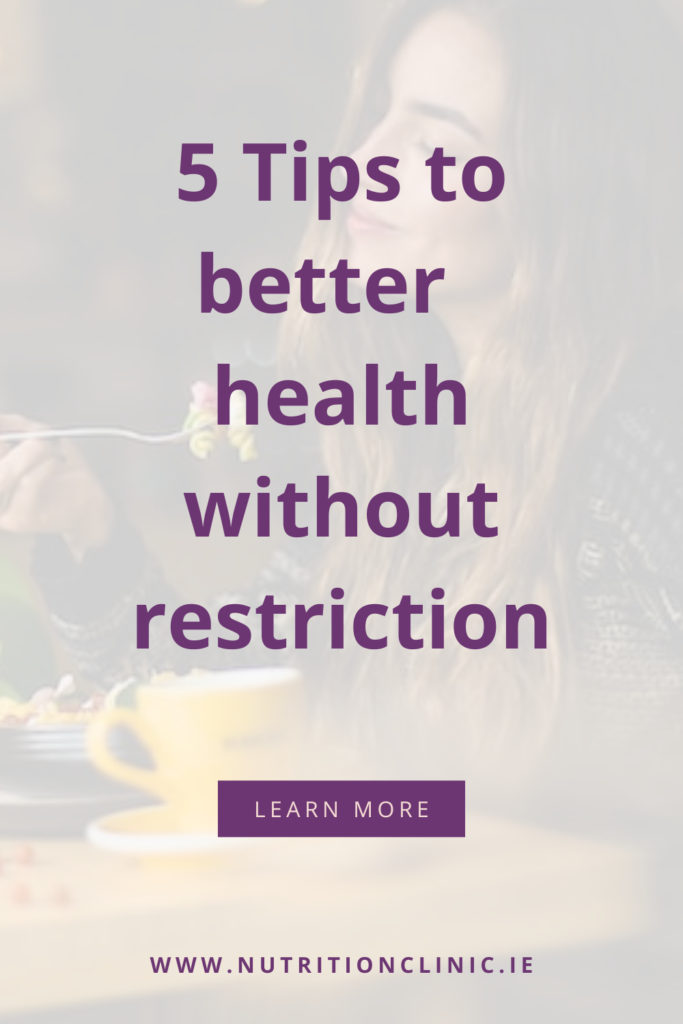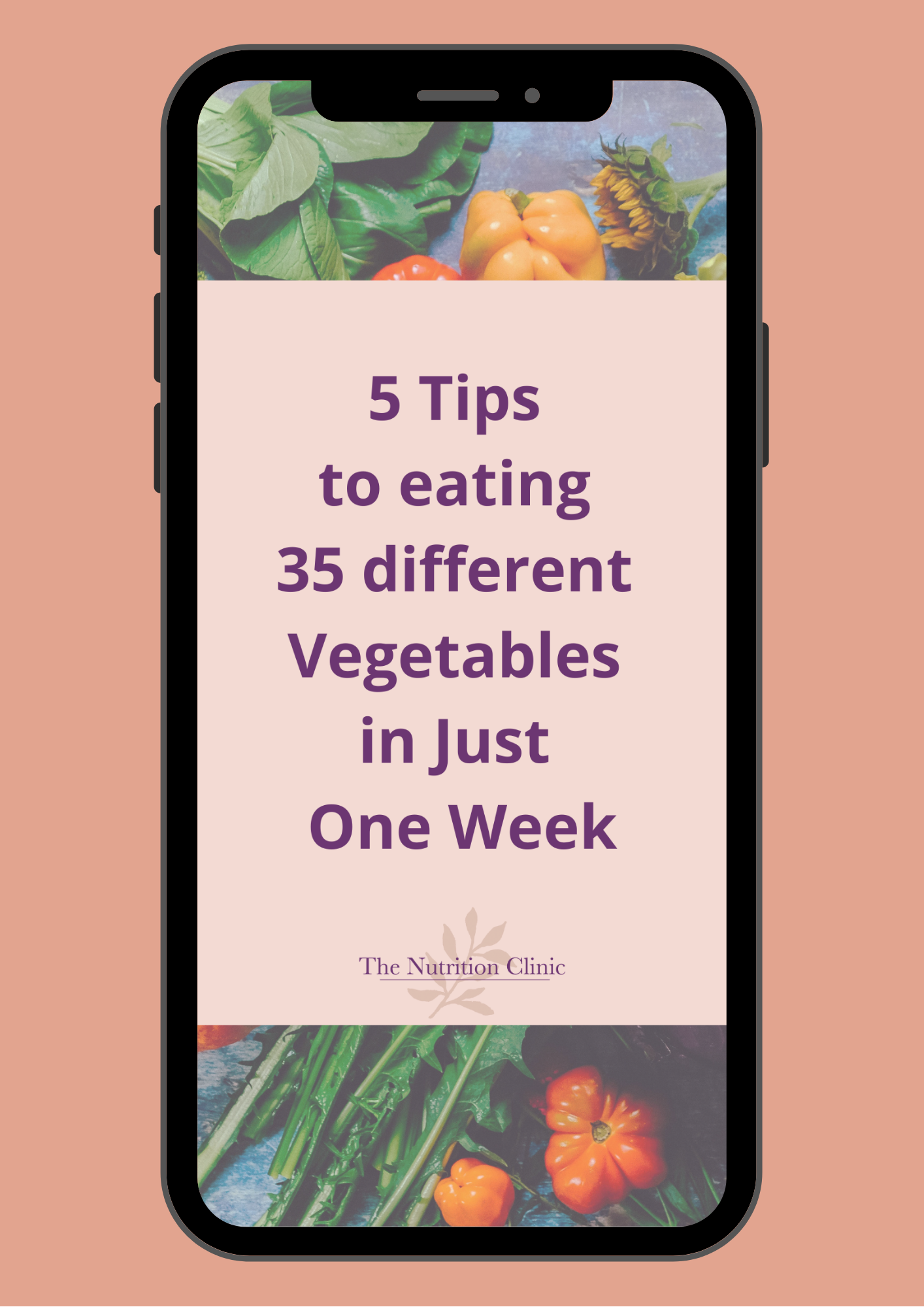If you’ve ever wondered if it’s possible to improve your health without feeling restricted then you’re not alone. I get asked this question so often as a nutritional therapist, so many people struggle with thinking that they need to restrict certain foods to be healthy or to improve their health. The good news is that there’s lots of ways you can improve your health without feeling deprived of those foods you love! In fact, adding in more foods is more beneficial long-term. Here’s some tips and ideas to help you.
Eat a balanced diet (with a mixture of plant foods to get you started)
Going to extremes of anything is never a good thing. Either by following the latest trends that have you removing various foods. Or by overdoing it with other foods, so that you’re virtually turning green with the amount of green smoothies you’ve had!
Our body needs a balance of everything to fuel itself and get the nutrition it needs. When we try to follow strict diets or overdo it on those foods we perceive as being healthier, it not only makes sticking to a particular way of eating hard, but it’s also not actually healthy in the long-run. Note: for some health conditions such as coeliac disease for example, some food groups do need to be avoided.
A great way to start improving your health is to add in more foods in a balanced way! Following the healthy plate is a great start. Making sure your plate is half full of various plant foods at lunch and dinner will not only add in more vitamins and minerals, but the fiber from the plant foods will also fill you up so you don’t feel hungry. It also feeds your gut bacteria so it supports better gut health and immunity. If you suffer with digestive issues, adding in more variation in plants could improve it.
Not a fan of vegetables? Well a plant food encompasses everything from grains (so pasta, rice, quinoa, sourdough bread) to fruits, nuts, seeds, beans, lentils as well as vegetables. So there’s no need to overdo it on those green smoothies! If getting more plant foods into your diet feels like a struggle check out my free guide here.
Making sure you have at least 1/4 of your plate with a good quality protein is another. With the last quarter being made up of starchy carbohydrates. These encompass grains, beans, legumes and any starchy vegetable such as carrots, parsnip etc
Learn to listen to your body (and what it’s telling you)
There is no one way of being healthy, nor one way of eating that suits everyone. When you’re eating to be healthy, you should feel on top of the world. It should give you lots of energy. You should enjoy all that you eat while seeing improvements in your health overtime. Not the opposite. By listening to what your body is telling you, you will begin to see what foods suit you the best. For example if I was to eat a plate-full of pasta I know I’ll be asleep 20 minutes later! That volume of pasta just doesn’t suit me. However, I can still have that pasta, just not a plateful of it!
After every meal listen to what your body tells you. If you have plenty of energy, with no energy dips and can make it to your next meal without being too hungry, then the make-up of that meal suits you. If on the other hand, you’re reaching out for a snack for a pick-me-up after an hour or two, you may need to look at how much protein versus how much carbohydrates was in that meal and adjust. Again, if you feel overly full and bloated, maybe the types of foods on your plate need to be looked at.
Don’t force yourself to eat foods just because they’re ‘healthy’
Forcing yourself to eat some foods just because they’re healthier than others is not what eating to be healthy is about. Yes, broccoli is an amazing food with lots of powerful nutrients and benefits, but if you don’t like it there’s no need to force yourself to eat it just to be healthy either!
I don’t believe in forcing people to eat certain foods to create better health. There’s always another food out there that can give the same benefit that you’d enjoy eating instead. Take oily fish for example. Some people love fish, others hate it. However the benefits of oily fish are huge as they contain high levels of omega-3. This essential fat helps to lower heart disease, reduce inflammation, support better hormonal health and brain health. But there are other ways to get omega-3 in through foods. Seeds such as chia and flaxseeds are high in the precursor to omega-3 and the body converts these into omega-3. These seeds can be added to breakfasts as well as over salads, or in snacks via crackers etc.
Follow the 80:20 rule
Living life is all about the celebrations too. Birthdays, holidays, Christmas – these invariably revolve around lavish foods and drinks. Our body is designed to enjoy periods of lavish feasting without restriction. This dates back to when we first evolved and we would have experienced periods of famine as well as feasting.
Don’t label foods as ‘good’ or ‘bad’ – everything is good in moderation for health
The issue arises when this feasting becomes an everyday occurrence. To avoid any guilt of overindulgence I encourage my clients to think of becoming healthier as a journey and ultimately, what we’re aiming for, as a way of life. It’s not a transient destination, but something to work towards and enjoy the journey. This way of thinking is the opposite of feeling restricted. Once the indulgence or celebration is over, you just revert back to your normal, everyday eating habits. There’s no guilt for breaking a diet, or for eating something you wish you hadn’t as there wasn’t that feeling of restriction in the first place.
For everyday living I have found the best approach, both within my own life as well as with clients, is to follow the 80:20 rule. This means that for 80% of our meals we are focused on making them as healthy as we can manage for us at that time. For the other 20% of meals, if we have our cake and eat it, that’s OK too. If we look at this over the course of a week, assuming 3 meals a day, then 20% would equate to 4 meals over the course of the week that may not be as healthy as we’d like, and that’s OK.
Get advice to avoid unnecessary restriction
If you feel that you’re going from one healthy-eating-fad to another in an effort to become healthier or to get that energy you’ve always dreamed of. Or if you’re falling back on restriction-type diets as that’s all you know about when it comes to health and wellbeing or as a way to control digestive symptoms, know that you’re not the only one.
Restriction when it comes achieving any health goal had become the norm, but over the last few years, with more research, thankfully that’s changing. It really is about adding more in than taking things out when it comes to eating for better health. I’d encourage you to reach out for support as there’s no need for you to be stuck with a way of eating that doesn’t bring you joy or the benefits you want. Through working with a nutritional therapist like myself on my Totally Nourished You program we can draw up a plan that will ensure you’re getting all you need to support you on your better health journey but in a balanced, practical and enjoyable way.





0 Comments